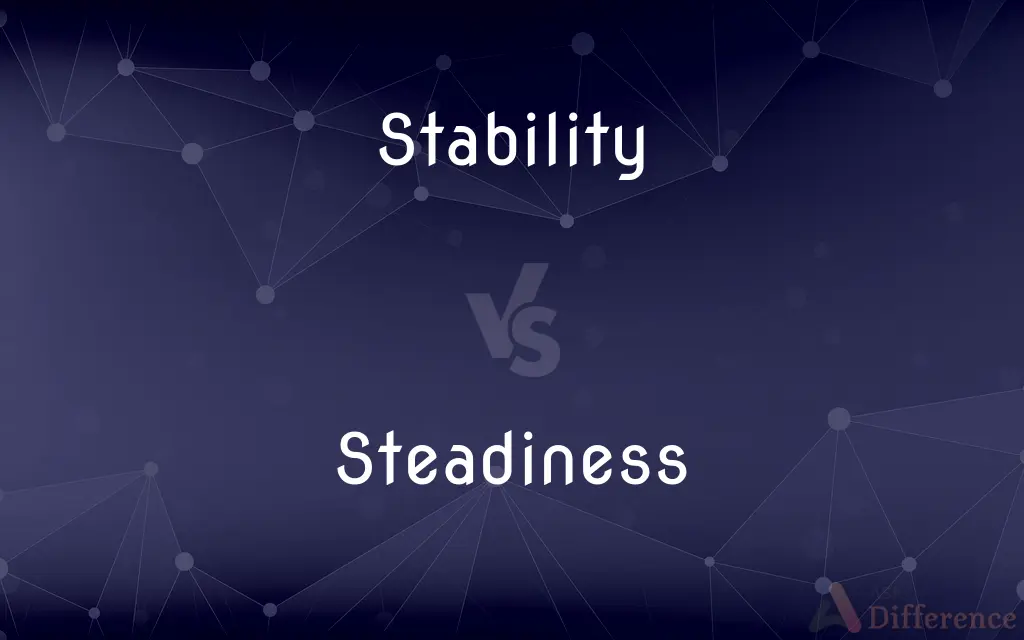Stability vs. Steadiness — What's the Difference?
By Tayyaba Rehman — Updated on September 13, 2023
Stability refers to a state of being unchanging and firm; Steadiness denotes consistent, unwavering progress or behavior.

Difference Between Stability and Steadiness
Table of Contents
ADVERTISEMENT
Key Differences
Stability implies a condition where something remains unchanged, resists disturbances, or retains its structure. On the other hand, steadiness describes a continuous, uniform behavior or progress, indicating consistency over a period of time. While stability might suggest a lack of change or movement, steadiness implies a regular pace or demeanor.
In systems or structures, stability is often about maintaining balance, ensuring that things don't collapse or falter. For steadiness, it's about maintaining a consistent rate or speed, not necessarily remaining still. For example, a building has stability when it stands firm during a storm; a vehicle has steadiness when it moves at a consistent speed despite rough roads.
Consider emotions. Emotional stability indicates a person remains largely unaffected by external events, maintaining their emotional balance. Emotional steadiness, however, might mean that a person processes and expresses emotions at a consistent rate, without extreme highs or lows.
The concept of stability often suggests resistance to external forces. A stable economy, for instance, isn't easily shaken by financial downturns. Conversely, the idea of steadiness implies a resilience and continuity in action. A steady hand, for instance, doesn’t waver even under pressure.
In relationships, stability might suggest a foundation that isn't easily rocked, a bond that withstands challenges. In contrast, steadiness in a relationship could point to the reliable and predictable behaviors of the individuals involved, providing a sense of security and consistency to the other party.
ADVERTISEMENT
Comparison Chart
Basic Definition
State of being unchanging and firm
Consistent, unwavering progress or behavior
Implication
Resistance to change
Continuity in action
In context of movement
Might suggest lack of movement
Suggests movement at a consistent rate
In context of emotions
Refers to emotional balance and lack of disturbance
Refers to uniformity in expressing emotions
In context of action
Refers to maintaining a position or condition
Refers to carrying out an action without wavering
Compare with Definitions
Stability
The state of being firm and unchanging.
The stability of the foundation ensures the building's longevity.
Steadiness
Uniformity in rate or speed.
The steadiness of the ship's course kept passengers comfortable.
Stability
The quality of being enduring and dependable.
The stability of their friendship made them inseparable.
Steadiness
Absence of erratic behavior or fluctuations.
The steadiness of his pulse indicated good health.
Stability
Resistance to disturbances or disruptions.
The country's economic stability is admired globally.
Steadiness
Quality of being consistent and unwavering.
Her steadiness during the crisis was commendable.
Stability
Maintenance of equilibrium or balance.
The gymnast showed impressive stability during her routine.
Steadiness
Reliability in character or demeanor.
His steadiness made him a favorite among his peers.
Stability
The condition of being free from frequent changes.
Market stability is crucial for investor confidence.
Steadiness
Dependability in progress or action.
The project's steadiness ensured its timely completion.
Stability
Resistance to change, deterioration, or displacement.
Steadiness
Firm in position or place; fixed.
Stability
Constancy of character or purpose; steadfastness.
Steadiness
Direct and unfaltering; sure.
Stability
Reliability; dependability.
Steadiness
Free or almost free from change, variation, or fluctuation; uniform
A steady increase in value.
A steady breeze.
Stability
The ability of an object, such as a ship or aircraft, to maintain equilibrium or resume its original, upright position after displacement, as by the sea or strong winds.
Steadiness
Not easily excited or upset
Steady nerves.
Stability
Roman Catholic Church A vow committing a Benedictine monk to one monastery for life.
Steadiness
Unwavering, as in purpose; steadfast.
Stability
The condition of being stable or in equilibrium, and thus resistant to change.
This platform offers good stability
Steadiness
Reliable; dependable.
Stability
The tendency to recover from perturbations.
Emotional stability
Steadiness
Temperate; sober.
Stability
The state or quality of being stable, or firm; steadiness; stableness; firmness; strength to stand without being moved or overthrown; as, the stability of a structure; the stability of a throne or a constitution.
Steadiness
To make or become steady.
Stability
Steadiness or firmness of character; firmness of resolution or purpose; the quality opposite to fickleness, irresolution, or inconstancy; constancy; steadfastness; as, a man of little stability, or of unusual stability.
Steadiness
Used to direct a helmsman to keep a ship's head in the same direction
Steady as she goes!.
Stability
Fixedness; - as opposed to fluidity.
Since fluidness and stability are contrary qualities.
Steadiness
The person whom one dates regularly, usually exclusively.
Stability
The quality or attribute of being firm and steadfast
Steadiness
The state of being steady
Stability
A stable order
Steadiness
The degree of stability
Stability
The quality of being free from change or variation
Steadiness
The quality or state of being steady.
Steadiness is a point of prudence as well as of courage.
Steadiness
The quality of being steady or securely and immovably fixed in place
Steadiness
The quality of being steady--regular and unvarying
Common Curiosities
What does Steadiness suggest in terms of movement?
Steadiness implies movement or behavior at a uniform, consistent rate.
Can a system exhibit both Stability and Steadiness?
Yes, a system can be stable (resistant to disturbances) and exhibit steadiness (consistent behavior) simultaneously.
How does Stability relate to change?
Stability often implies resistance to change or a lack of frequent changes.
What does Stability imply in general?
Stability refers to a state where something remains unchanging, balanced, and resistant to disturbances.
How is Steadiness generally defined?
Steadiness denotes a consistent, unwavering behavior or progress over time.
Which term, Stability or Steadiness, is more about resistance?
Stability is more about resistance, especially to external changes or forces.
How does Steadiness relate to predictability?
Steadiness often implies predictability due to its consistent and unwavering nature.
What’s the key difference between Stability and Steadiness in terms of action?
Stability refers to maintaining a certain state or condition, while steadiness is about carrying out an action consistently.
In what context is Stability crucial in finance?
In finance, stability is crucial in contexts like market conditions, currency value, and economic health.
Does Stability always mean immobility?
No, stability refers to resistance to disturbances but doesn't necessarily imply immobility.
Can Steadiness exist without Stability?
Yes, something can progress steadily (steadiness) even if it isn’t in a stable environment or condition.
Can a person possess emotional Stability and not Steadiness?
Yes, someone might maintain emotional balance (stability) but express emotions erratically, lacking steadiness.
How is Steadiness perceived in leadership?
In leadership, steadiness is perceived as a leader's consistent behavior, decisions, and response, earning trust.
How does Stability relate to resilience?
Stability can be a manifestation of resilience, as both involve withstanding challenges or disturbances.
Is Steadiness always a positive trait?
Mostly, yes. Steadiness is seen as reliability and consistency. However, in some contexts, adaptability might be preferred over steadiness.
Share Your Discovery

Previous Comparison
Associate vs. Officer
Next Comparison
Abase vs. AbateAuthor Spotlight
Written by
Tayyaba RehmanTayyaba Rehman is a distinguished writer, currently serving as a primary contributor to askdifference.com. As a researcher in semantics and etymology, Tayyaba's passion for the complexity of languages and their distinctions has found a perfect home on the platform. Tayyaba delves into the intricacies of language, distinguishing between commonly confused words and phrases, thereby providing clarity for readers worldwide.
















































